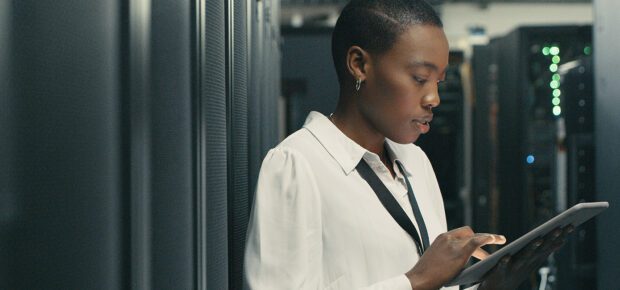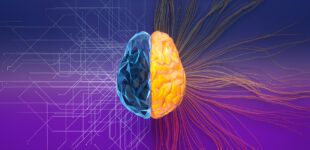July 27, 2023
Jobs in cybersecurity are hot, and qualified employees are in demand. According to data compiled by the National Institute for Standards and Technology, there was a global shortage of 3.4 million cybersecurity workers in 2022. There were more than 663,000 cybersecurity jobs openings in the U.S. alone.
The rise of generative AI tools such as ChatGPT has raised new questions about whether these tools could help close the job gap or exacerbate it. As a result, many experts see them as a double-edged sword.
On the one hand, attackers can use generative AI to “greatly reduce the cost of doing evil in network security,” said Daozhuang Lin, IEEE Senior Member.
On the other hand, generative AI may be able to accelerate the development of software code and new tools to thwart cyberattacks.
“These large language models are a fundamental paradigm shift,” IEEE Member Yale Fox recently told the publication Data Center Knowledge. “The only way to fight back against malicious AI-driven attacks is to use AI in your defenses. Security managers at data centers need to be upskilling their existing cybersecurity resources as well as finding new ones who specialize in artificial intelligence.”
For now, the question over whether generative AI will be a boon or a bane to cybersecurity executives seeking to hire is largely unanswerable. That hasn’t stopped a broader discussion about how it might change the work that cybersecurity professionals do.
Here’s what the experts are saying about the way generative AI may shape the nature of cybersecurity jobs:
- Software developers might have to do more validation and testing on AI-generated code, putting more emphasis on quality control skills. Quality control personnel will need to acquire knowledge and skills related to evaluating and assessing the performance of generative AI models, notes IEEE Senior Member Amol Gulhane.
“They will need to understand the limitations and biases associated with these models, identify potential vulnerabilities and test the generated outputs against predefined standards and security requirements,” Gulhane said”
- Generative AI may reduce the paperwork and documentation burden cybersecurity professionals face. Although much is made of the hands-on-keyboard skills of cybersecurity analysts and their detective powers of finding a needle in a needlestack, less attention is paid to the sheer volume of documentation that the role can require.
“This documentation can take many forms, from writing up their notes on a false positive alert to writing up a playbook for how to conduct a new type of investigation,” said IEEE Senior Member Kayne McGladrey. “While this documentation has tremendous organizational value, it’s also one of the least popular and time-consuming tasks conducted by analysts. By using AI to automate tasks such as summarizing text and generating reports according to predefined formats, analysts can significantly save time.”
- It could accelerate the testing of new products for security flaws in which internal security experts try to “hack” a product in a way that developers hadn’t anticipated, a process known as red teaming.
“Red teamers are occasionally tasked with evaluating the security of a software component as part of an organization’s software development lifecycle,” McGladrey said. “Unfortunately, this comes with schedule pressures; the longer the red teamers take, the longer until the software can be released to general availability, and so not all organizations follow this model.”
Learn more: Ethical hacking helps businesses and software developers see things from the perspective of people that aren’t so ethical. It’s a vital skill that improves the security of products before they are released to the public. Learn about how ethical hacking can fight cybercrime on the Innovation at Work blog.





 Meaningful Momentum or Running in Place?
Meaningful Momentum or Running in Place? AI Through Our Ages
AI Through Our Ages Liquid Infrastructure: Our Planet's Most Precious Resource
Liquid Infrastructure: Our Planet's Most Precious Resource The Impact of Technology in 2025
The Impact of Technology in 2025 Quantum and AI: Safeguards or Threats to Cybersecurity?
Quantum and AI: Safeguards or Threats to Cybersecurity? Why AI Can't Live Without Us
Why AI Can't Live Without Us Bits, Bytes, Buildings and Bridges: Digital-Driven Infrastructure
Bits, Bytes, Buildings and Bridges: Digital-Driven Infrastructure Impact of Technology in 2024
Impact of Technology in 2024 Emerging AI Cybersecurity Challenges and Solutions
Emerging AI Cybersecurity Challenges and Solutions The Skies are Unlimited
The Skies are Unlimited Smart Cities 2030: How Tech is Reshaping Urbanscapes
Smart Cities 2030: How Tech is Reshaping Urbanscapes Impact of Technology 2023
Impact of Technology 2023 Cybersecurity for Life-Changing Innovations
Cybersecurity for Life-Changing Innovations Smarter Wearables Healthier Life
Smarter Wearables Healthier Life Infrastructure In Motion
Infrastructure In Motion The Impact of Tech in 2022 and Beyond
The Impact of Tech in 2022 and Beyond Cybersecurity, Technology and Protecting Our World
Cybersecurity, Technology and Protecting Our World How Technology Helps us Understand Our Health and Wellness
How Technology Helps us Understand Our Health and Wellness The Resilience of Humanity
The Resilience of Humanity Harnessing and Sustaining our Natural Resources
Harnessing and Sustaining our Natural Resources Creating Healthy Spaces Through Technology
Creating Healthy Spaces Through Technology Exceptional Infrastructure Challenges, Technology and Humanity
Exceptional Infrastructure Challenges, Technology and Humanity The Global Impact of IEEE's 802 Standards
The Global Impact of IEEE's 802 Standards Scenes of our Cyber Lives: The Security Threats and Technology Solutions Protecting Us
Scenes of our Cyber Lives: The Security Threats and Technology Solutions Protecting Us How Millennial Parents are Embracing Health and Wellness Technologies for Their Generation Alpha Kids
How Millennial Parents are Embracing Health and Wellness Technologies for Their Generation Alpha Kids Space Exploration, Technology and Our Lives
Space Exploration, Technology and Our Lives Global Innovation and the Environment
Global Innovation and the Environment How Technology, Privacy and Security are Changing Each Other (And Us)
How Technology, Privacy and Security are Changing Each Other (And Us) Find us in booth 31506, LVCC South Hall 3 and experience the Technology Moon Walk
Find us in booth 31506, LVCC South Hall 3 and experience the Technology Moon Walk Virtual and Mixed Reality
Virtual and Mixed Reality How Robots are Improving our Health
How Robots are Improving our Health IEEE Experts and the Robots They are Teaching
IEEE Experts and the Robots They are Teaching See how millennial parents around the world see AI impacting the lives of their tech-infused offspring
See how millennial parents around the world see AI impacting the lives of their tech-infused offspring Take the journey from farm to table and learn how IoT will help us reach the rising demand for food production
Take the journey from farm to table and learn how IoT will help us reach the rising demand for food production Watch technical experts discuss the latest cyber threats
Watch technical experts discuss the latest cyber threats Explore how researchers, teachers, explorers, healthcare and medical professionals use immersive technologies
Explore how researchers, teachers, explorers, healthcare and medical professionals use immersive technologies Follow the timeline to see how Generation AI will be impacted by technology
Follow the timeline to see how Generation AI will be impacted by technology Learn how your IoT data can be used by experiencing a day in a connected life
Learn how your IoT data can be used by experiencing a day in a connected life Listen to technical experts discuss the biggest security threats today
Listen to technical experts discuss the biggest security threats today See how tech has influenced and evolved with the Games
See how tech has influenced and evolved with the Games Enter our virtual home to explore the IoT (Internet of Things) technologies
Enter our virtual home to explore the IoT (Internet of Things) technologies Explore an interactive map showcasing exciting innovations in robotics
Explore an interactive map showcasing exciting innovations in robotics Interactively explore A.I. in recent Hollywood movies
Interactively explore A.I. in recent Hollywood movies Get immersed in technologies that will improve patients' lives
Get immersed in technologies that will improve patients' lives